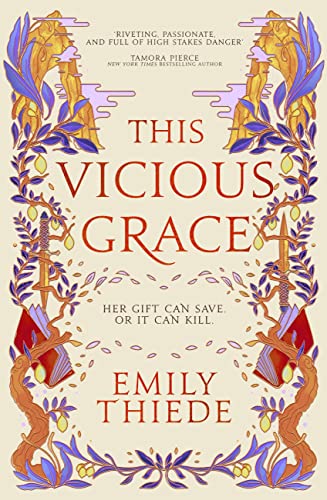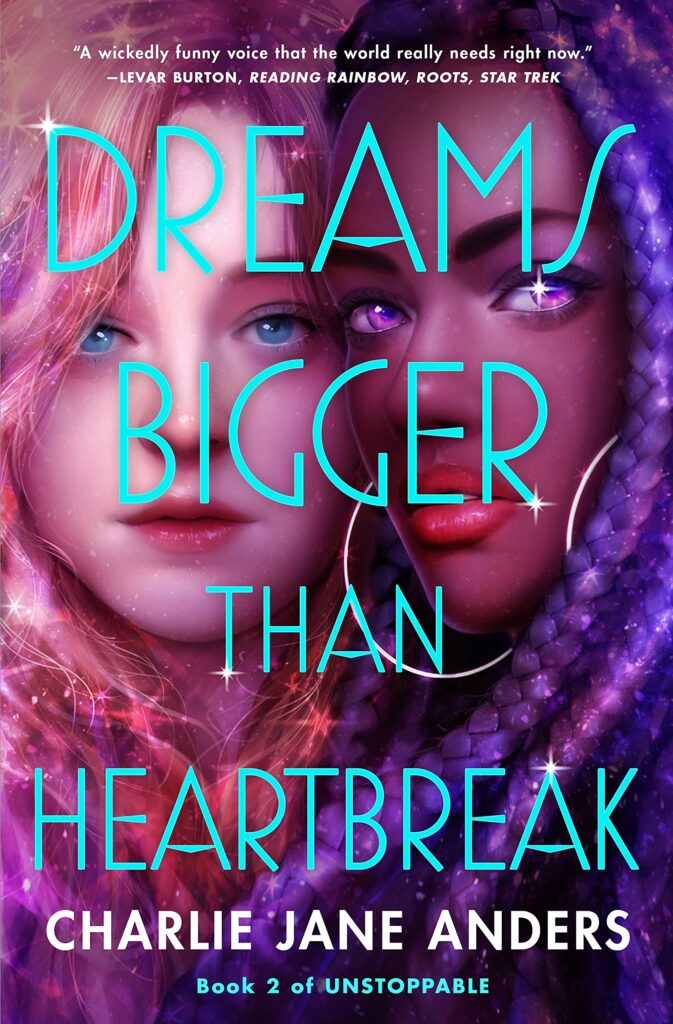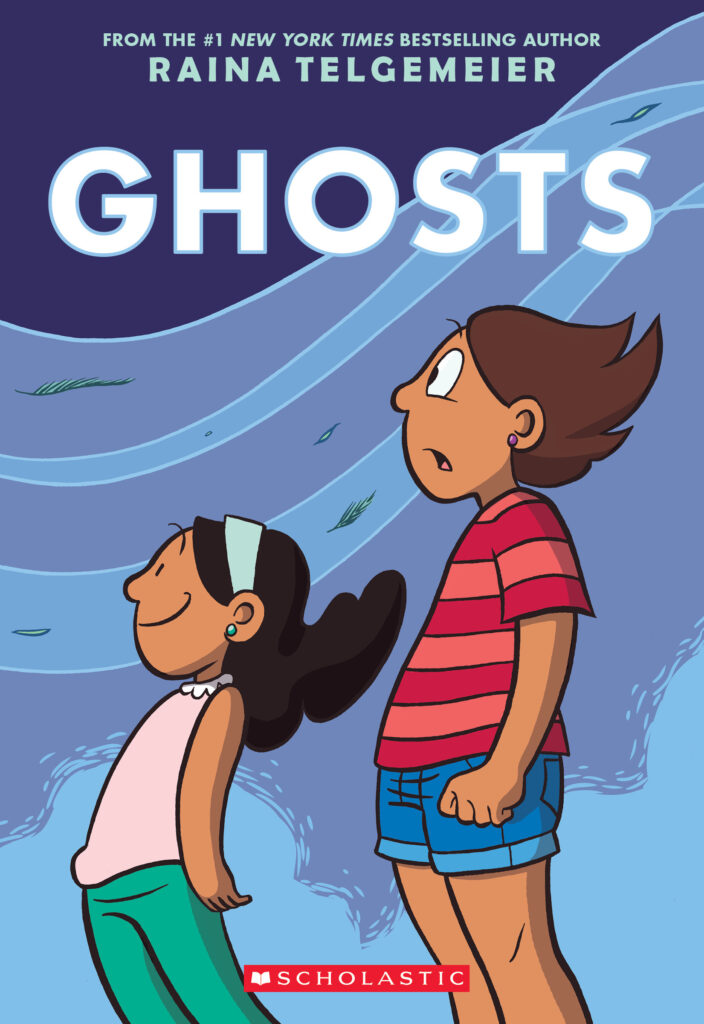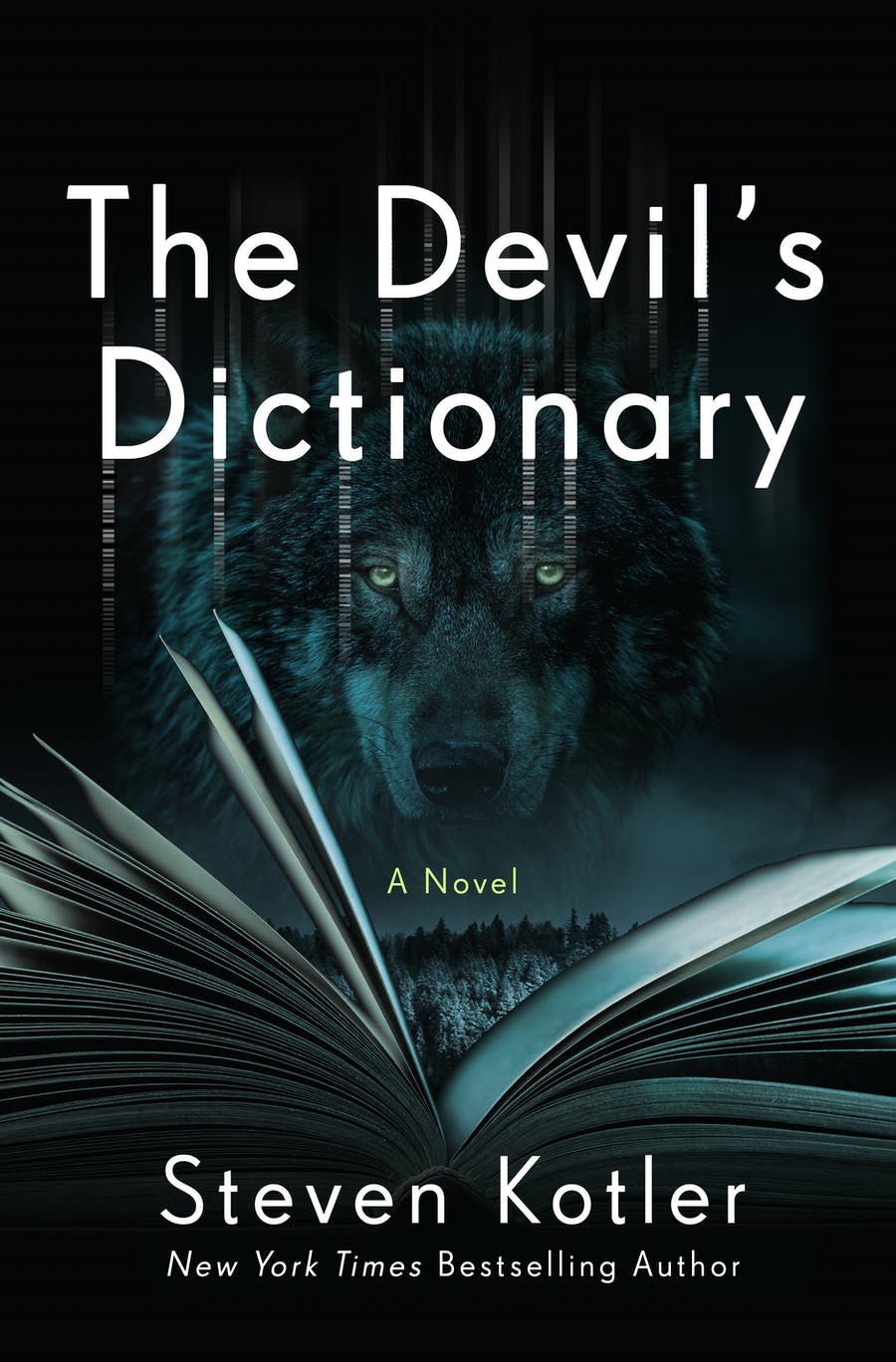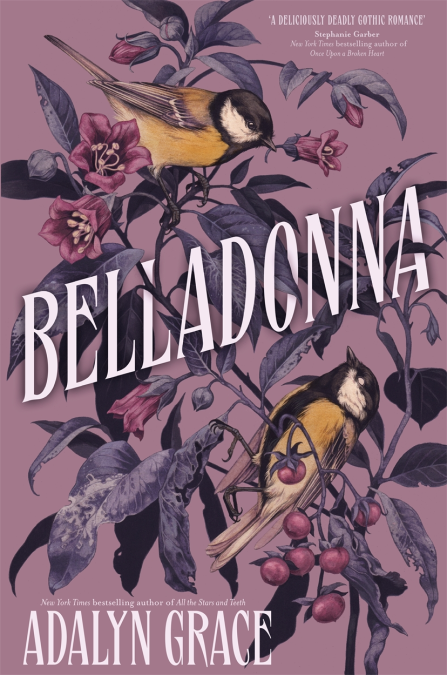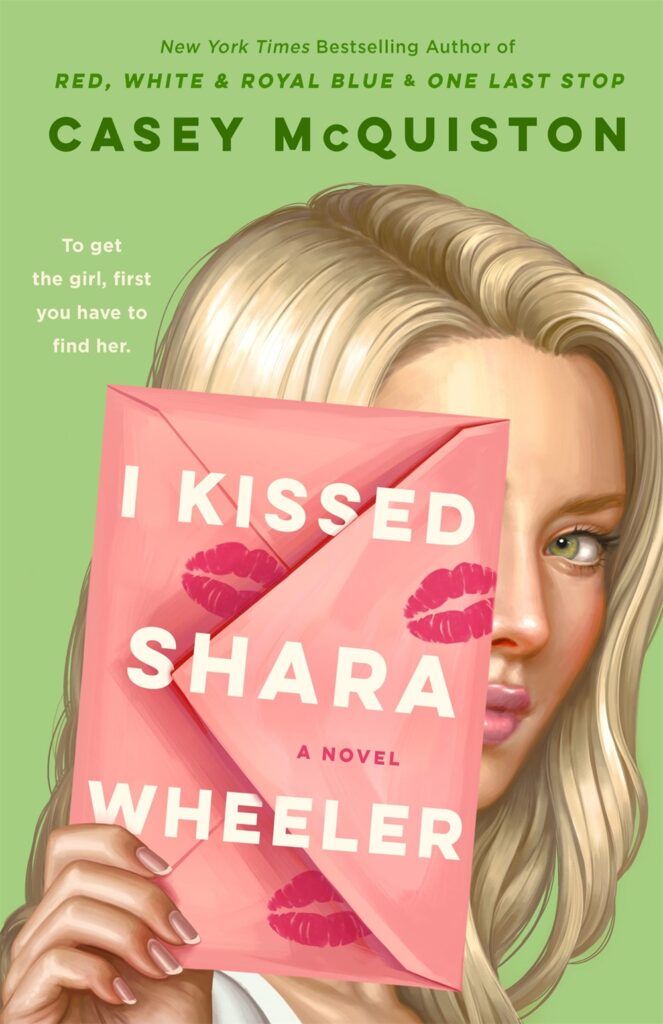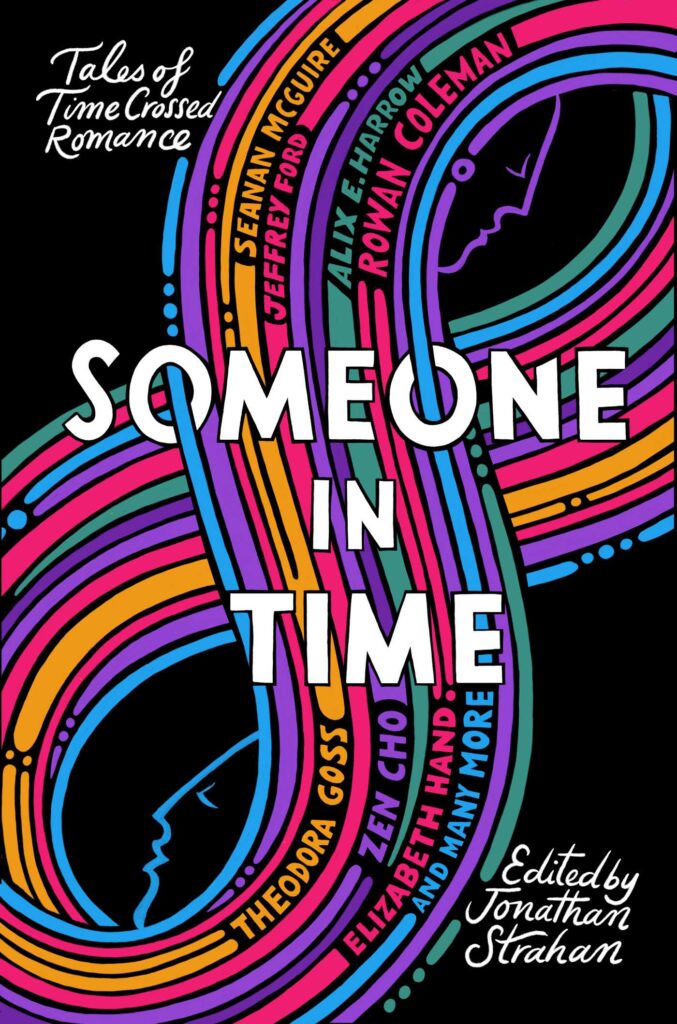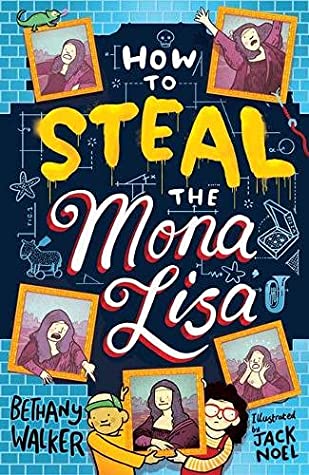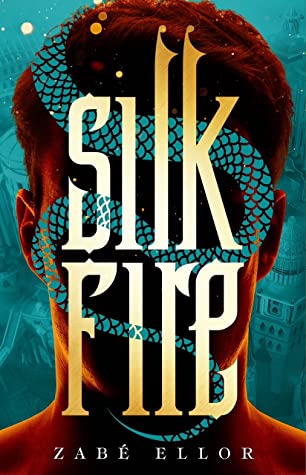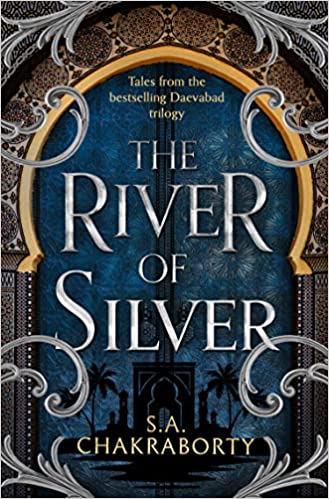-
Monday Minis
This week’s Monday Minis are coming to you from Eastercon – the exotic holiday destination of London Heathrow. Sun and I are enjoying our time at Con, meeting many lovely people and listening to inspiring panels. And occasionally hiding out in our room, reading and reviewing – like getting this post ready! Many thanks to the publicists for sending me review copies of these books, all opinions are my own.
This Vicious Grace by Emily Thiede is the first book in The Last Finestra series. It has a great hook – Alessa has a god-given gift of magic, supposed to help save her city from a vicious demon attack, except she keeps accidentally killing her suitors instead of amplifying their powers. She’s pretty desperate, she had one job and she’s definitely failing at it. In comes Dante, a mysterious rogue, who seems to be the one person she can touch – so she keeps him around as her bodyguard, all the while trying to solve her other problems. Sadly, I didn’t stay as hooked to the story as I did to the concept, and found Alessa rather frustrating and the chemistry between both her and Dante and her and the other suitors lacking. A lot of people seem to really like this Italian-inspired YA fantasy though, so it’s probably more on me than the book itself – a case of mismatched expectations and reality. I wish I’d enjoyed it more, but while it was a fine book to entertain, it wasn’t more than that for me, and I don’t think I will be continuing the series.
Dreams Bigger Than Heartbreak by Charlie Jane Anders is the middle book in the Unstoppable trilogy. Following up on last year’s Victories Greater Than Death, this is Anders’ first sequel – her first foray into YA and into writing something that isn’t standalone. That said, this volume both manages to build on the strengths of the first book, as well as not quite live up to my expectations – it is the second book in a trilogy, the one where many threads are left open and few plotlines are taken to their conclusion. Whereas Victories very much was concluded in itself, an arc that could mostly be left on its own, Dreams took these characters, took the ensemble cast, and fragmented it again. The found family aspects of the first book that I loved so much took a bit of a back seat as each of the characters embarked on their own arc and worked on establishing themselves as an individual in their changed circumstances – which was very interesting, but felt less compelling and comforting than the first book for me personally. I still adored Rachael, my favourite character, who was given plenty of space for her anxiety to unfold (THANK YOU CHARLIE JANE for giving us such a wonderful character with anxiety rep!) – and who got to grow outside of her friendship with Tina. Definitely still a good book, and I am looking forward to reading the conclusion, even if it didn’t quite have the magic of the first one.
Ghosts by Raina Telgemaier has been out on the other side of the Atlantic for a while, but the UK arm of Scholastic has only just brought it over here. This is a middle grade graphic novel set in Northern California, combining Latinx Day of the Dead traditions with Cystic Fibrosis rep. Cat is frustrated that her family has been uprooted to a new town, providing a better climate for her chronically ill sister Maya, and even more so when they meet local boy Oscar who won’t shut up about ghosts. And when an encounter with ghosts causes a flare-up of Maya’s Cystic Fibrosis, Cat has to find a way to help her sister despite her reluctance to embrace the magic. On paper, this is everything I love – the exact kind of graphic novel I tend to immediately fall in love with. But I struggled to connect with it, I think partially because Cat is so reluctant towards anything supernatural and focused on reality – whereas I am the type of person to immediately embrace anything magical. I did appreciate the chronic illness rep, especially how Maya is disabled but doesn’t let it take away from her love of life and desire to experience the world. Far from embracing toxic positivity or a rose-tinted view, it is a portrayal with nuance and dignity. Ghosts is a lovely story and the art suits it really well, and despite not fully connecting with it, I would recommend it on to middle grade readers.
-
The Devil’s Dictionary – Steven Kotler
For those who are looking for an unconventional sci-fi read exploring topics of ecology, empathy and the morality of making money, this book will have you snap your fingers and go ‘found it!’ The Devil’s Dictionary is full of complex questions, but it never leaves levity behind. It’s wry protagonist and clever, tongue-in-cheek narrative style are bound to get you hooked.
RELEASE DATE: 19/04/2022
STAR RATING: 5/5 *
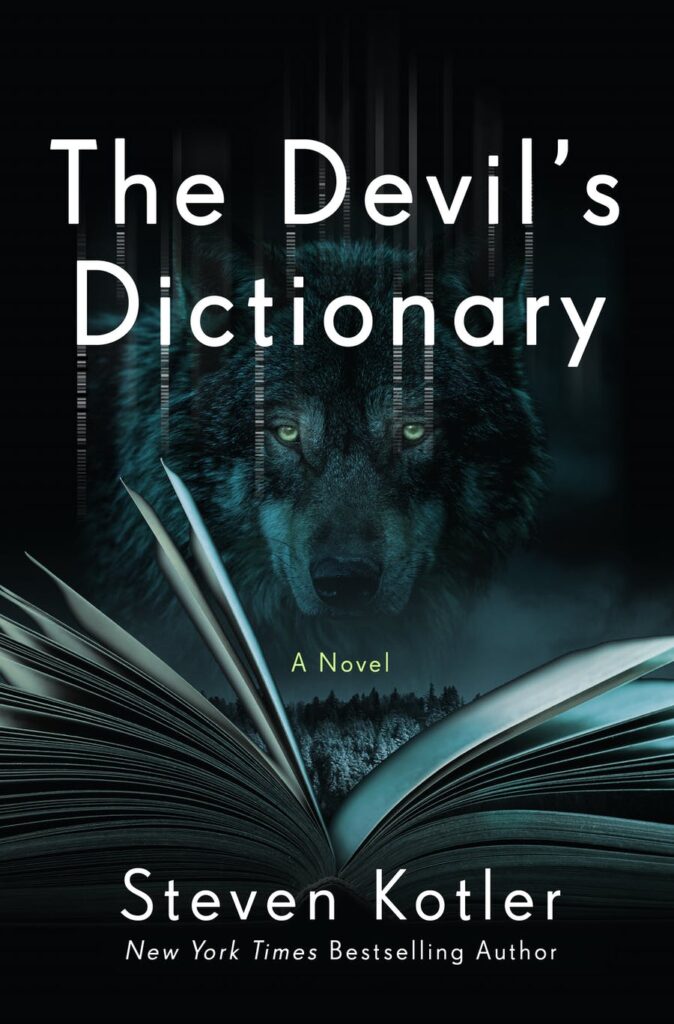
SYNOPSYS:
Hard to say exactly when the human species fractured. Harder to say when this new talent arrived. But Lion Zorn, protagonist of Last Tango in Cyberspace, is the first of his kind—an empathy tracker, an emotional forecaster, with a felt sense for how culture evolves and the future arrives.
It’s also a useful skill in today’s competitive business market.
In The Devil’s Dictionary, when a routine em-tracking job goes sideways and em-trackers themselves start disappearing, Lion finds himself not knowing who to trust in a life and death race to uncover the truth. And when the trail leads to the world’s first mega-linkage, a continent-wide national park advertised as the best way to stave off environmental collapse, and exotic animals unlike any on Earth start showing up—Lion’s quest for truth becomes a fight for the survival of the species. (from Macmillan)
OPINIONS:
Hands down, my favourite read of the year! Kotler takes no prisoners in this sci-fi novel meets detective mystery. The premise that a mind-altering substance actually increases your empathy to other, especially other-than-human, beings is refreshing after the convention of sci-fi tech equaling emotionless rationality. It is also an excellent premise through which to discuss human-led ecological change, which Kotler does exceptionally well.
Kotler’s language has a superb physicality to it. Like ‘one of those info-marketers turned self-help gurus, …, who seems to have self-helped himself to damn nearly every piece of real estate in this part of London’ – a situation that is both alternative reality and also here, now, unapologetically in your face. The dialogue especially is a marvellous thing. The story’s diverse cast is captured through unique linguistic patterns and mannerisms. The conversations are vibrant, with interruptions, tangents and in-jokes that make them come alive. I’ve had these conversations with my friends. Well, maybe not exactly these conversations…
Since I work on ecological themes in literature for my research, The Devil’s Dictionary was a goldmine of philosophical quandaries and popular imagination assumptions, all bound up in a riveting plot that zigs and zags its way through the mystery, but never lets the readers lose themselves. I finished the book galvanised; perhaps, because despite tackling current social concerns, the novel does not preach anything, but presents a complex situation in a complex world. And that world is not lacking in beauty for being imperfect. It’s a book with feeling, and I wholeheartedly recommend it to anyone!
-
Portrait of a Thief – Grace D. Li
Portrait of a Thief is a brilliant book combining tropes of dark academia with the classic heist and interrogating the effects of colonialism both on society and on the individuals as all of the main characters are Chinese-American with a variety of backgrounds and relationships to their culture. One that I’d highly recommend, and I’m very much looking forward to having a finished copy in my hands soon.
Many thanks to Hodder & Stoughton for sending me an eARC of Portait of a Thief via NetGalley. All opinions are my own.
RELEASE DATE: 14/04/2022
STAR RATING: 4.5/5 ✶

SUMMARY: This was how things began: Boston on the cusp of fall, the Sackler Museum robbed of 23 pieces of priceless Chinese art. Even in this back room, dust catching the slant of golden, late-afternoon light, Will could hear the sirens. They sounded like a promise.
Will Chen, a Chinese American art history student at Harvard, has spent most of his life learning about the West – its art, its culture, all that it has taken and called its own. He believes art belongs with its creators, so when a Chinese corporation offers him a (highly illegal) chance to reclaim five priceless sculptures, it’s surprisingly easy to say yes.
Will’s crew, fellow students chosen out of his boundless optimism for their skills and loyalty, aren’t exactly experienced criminals. Irene is a public policy major at Duke who can talk her way out of anything; Daniel is pre-med with steady hands and dreams of being a surgeon. Lily is an engineering student who races cars in her spare time; and Will is relying on Alex, an MIT dropout turned software engineer, to hack her way in and out of each museum they must rob.
Each student has their own complicated relationship with China and the identities they’ve cultivated as Chinese Americans, but one thing soon becomes certain: they won’t say no.
Because if they succeed? They earn an unfathomable ten million each, and a chance to make history. If they fail, they lose everything . . . and the West wins again. (from Coronet)OPINIONS: I think this is my favourite non-SFF book I’ve read this year. It combines so many things I tend to love about books – dark academia vibes, a good heist, strong characters with complex backgrounds, and most of all, being a commercial and accessible story with immense depth. Through looking at both colonial theft of art by major museums and the complicated relationships to identity all of the main characters have in regards to being Chinese-American, Portrait of a Thief gives the reader much opportunity to think further than the surface level heist story, but by packaging it in an accessible way, it makes readers more open to receive the message. And that is one of my absolute favourite things about books right now. Thinking about museums and how their collections are largely based on objects looted through colonialism never fails to make me grumpy, so this really felt like a book written specifically for me. (If you’re in London and feel similarly, the V&A has an exciting exhibit of reproductions of major landmarks and sculptures! Instead of looting them they made their own to give us an impression, all the way back in the 19th century)
The story is compelling – as behooves a heist – but it is also a lot of fun. The characters are all charming in their own ways, from Will, who is passionate about art, to Irene who can persuade anyone to do anything (that girl just rolls nat20 after nat20 on persuasion!) or Lily who is a student but also races cars passionately. They come to life in a way that makes the reader almost feel like part of their gang by the end, and while, of course, the idea that a random group of college students can pull of these heists requires a level of suspension of disbelief, as a whole, their shenanigans make sense, and I cheered every time something went off without them being caught.
All in all, just a brilliant book, and I highly recommend it to anyone, even if it’s not necessarily the genre you usually read. It has something for everyone, romance, action, charm, discussion of complex issues, the whole shebang, so really, there are no excuses not to at least give this a shot. I can’t speak to the nuances of cultural representation, but for me, it was an interesting perspective to read, and it felt organic, adding to the book and its story rather than overpowering it.
Add Portrait of a Thief to your Goodreads here, and order a copy via Bookshop here (affiliate link).
-
Monday Minis
Today’s Monday Minis are back in full swing with three books I enjoyed very much. Massive thanks to the respective publicists for sending me eARCs of these books, all opinions are my own, as usual.
Belladonna by Adalyn Grace is a delightfully dark YA fantasy. It is a new take on the old trope of Death and the Maiden – and we quite literally have Death appear as a character, which thanks to Terry Pratchett’s iconic character has become one of my favourite things. Belladonna is fast-paced, hooks the reader quickly and is full of not all-together unforseen twists. Signa, the main character, just won’t die. In a backstory reminiscent of A Series of Unfortunate Events, her guardians, however, keep dying. And now she’s sent to the last relatives she knows of – an aunt. Her aunt has passed away in the meantime, though, so she’s staying with the uncle and his two children, a son and a sickly daughter in their haunted mansion. Hitting on every Gothic trope in the book, this is just a wonderful escapist story that I couldn’t stop compulsively reading. It never felt like it went in a particularly unexpected direction or re-invented anything major, but it doesn’t need to. It does exactly what it says on the tin, and does so very well.
I Kissed Shara Wheeler by Casey McQuiston took me a while to get into. From the blurb I wasn’t quite sure whether this was going to be a contemporary rom-com or one with a supernatural twist – Shara Wheeler disappears after kissing three people on the same night, nemesis Chloe, neighbour Rory and boyfriend Smith, leaving behind only a series of pink envelopes. When I realised that this was in fact a purely human-based story, and one set in the deep South of Alabama, my enthusiasm started to wane a bit – McQuiston’s One Last Stop was one of my absolute favourite books of 2021, largely because of its time-slip element and NYC setting. However, once I really got stuck into the story and started to get to know this cast of characters, they evolved from superficial high school stereotypes to multi-faceted, loveable people, and into a host of queer kids just coming into their own – which felt very intentional. I couldn’t put the book down, and kept sneaking chapters during work (which meant I ended up working very late that day…). I Kissed Shara Wheeler is basically the movie John Hughes would make in 2022, aimed at the queer and diverse audience of teens today. Highly recommended if you’re looking for a fun read now that it’s warmer outside and you can take a book to the park.
Someone in Time edited by Jonathan Strahan is a solid anthology of stories centred around time-travel and romance. It has a brilliant line-up, featuring authors such as Alix E. Harrow, Zen Cho, Theodora Goss, Sarah Gailey and many more, which made me run towards my review copy. As with most anthologies, not all stories worked equally well for me, and with this one especially I noticed the bookending with the strongest stories. I found that the first few were strong, then it had a – for me – weaker middle, and then the last few stories were really strong again, ending on what was the absolute strongest story of the collection, Ellen Klages’ tale of female physicist and lesbian culture in the 1950s. And really, it made me a bit sad that apart from Klages’ story, those that resonated most strongly with me were those by authors I was already familiar with and whose work I knew I enjoyed. Part of why I love anthologies so much is because it gives me the opportunity to encounter new authors, find new favourites, and it felt like I missed out on that with Someone in Time. But as a whole, I really enjoyed it – and those stories that worked for me worked really well. So it’s a definite yes from me!
-
A Thousand Steps Into Night – Traci Chee
I love traveling with the help of books – especially in these days. And A Thousand Steps Into Night takes us into a Japanese-inspired secondary world called Awara, following the adventures of Miuko. A world of demons, gods and humans, where anything can happen. I thoroughly enjoyed my stay, and I hope you’ll follow me there.
Many thanks to Harper360YA for sending me an ARC. All opinions are my own.
RELEASE DATE: 01/03/2022
STAR RATING: 4/5 ✶
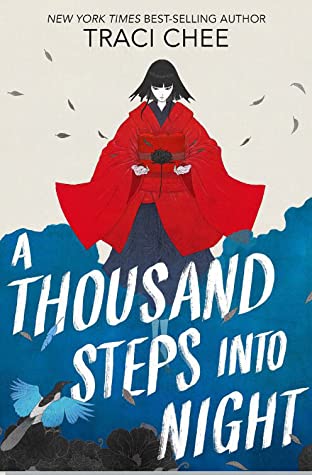
SUMMARY: In the realm of Awara, where gods, monsters, and humans exist side by side, Miuko is an ordinary girl resigned to a safe, if uneventful, existence as an innkeeper’s daughter.
But when Miuko is cursed and begins to transform into a demon with a deadly touch, she embarks on a quest to reverse the curse and return to her normal life. Aided by a thieving magpie spirit and continuously thwarted by a demon prince, Miuko must outfox tricksters, escape demon hunters, and negotiate with feral gods if she wants to make it home again.
With her transformation comes power and freedom she never even dreamed of, and she’ll have to decide if saving her soul is worth trying to cram herself back into an ordinary life that no longer fits her… and perhaps never did. (from HarperCollins)
OPINIONS: I love me a compelling YA. And A Thousand Steps Into Night has something that made me fall in love with it quite early on in the story: a scene in which Miuko, the main character, is disguised as male – magically, so she doesn’t have to worry about visibly passing – and has actual gender feelings about it. And not in the way of discovering that she is, in fact, trans or gender non-conforming, but a scene in which she moves through the world, ostensibly male for everyone who perceives her, but feeling uncomfortable in this body, specifically pointing out elements of dysphoria this disguise is giving her. And that is something I don’t think I’ve ever seen in a YA novel before. It is something so small – the scene only takes up a couple of pages – but it is something that meant a lot to me, to have this trope of a girl passing as a boy interrogated from the perspective of what this actually does with a person.
As a whole, the story is relatively fast-paced and compelling. It is in many ways a YA fantasy that revolves around tropes, and as such, doesn’t feel like it re-invents the wheel. But it is compelling and keeps the reader enthralled. Miuko is a charming heroine, and one who doesn’t feel overpowered. She isn’t incapable of failure – which for me is always something that irritates – and the narration sticks close enough to her to get her insecurities across. And that is where YA shines for me – the main characters are allowed to be insecure and not know how to deal with the world and unknown situations. I found A Thousand Steps Into Night to be a fun, escapist read with some deeper undertones that made me like it all the more.
Oh, and I loved the footnotes giving more information about the Japanese mythology behind creatures and elements in the story. Both in terms of pronunciation and backstory, I just loved the added focus on *this is something relevant* as somewhat of an information magpie.
Add A Thousand Steps Into Night to your Goodreads here, or order a copy via Bookshop here (affiliate link).
-
Monday Minis
I’ve been terrible at Monday Minis – life has been insane – but I’m back with three new titles to tell you about! Many thanks to the publicists for sending me review copies or eARCs of these, and as always, opinions are entirely my own and publishers and especially the lovely publicists are not to blame.
How to Steal the Mona Lisa by Bethany Walker and illustrator Jack Noel is a lower middle grade story told through epistolary format. Which I’m not a fan of in the first place, and harder to convince me of its value in a highly illustrated children’s book. The main focus is emails between the main character and her grandmother – but these are full of hand-drawn pictures similar to what you’d expect would accompany a traditionally told story for the age category. So that already had me approach the book with a certain amount of grump. It is a book that I struggled with – and that I feel children may struggle too as it doesn’t hold tension well. I found myself wandering off rather often and not invested in the mystery or the characters as much as I would have liked, and I thought that it relied overly much on the reader realising how naive the main character is and feeling smart or smug for noticing things that she doesn’t. It isn’t a bad book, but not one that stands out to me, sadly, and one that I would only recommend if your child is especially drawn in by the format.
I was extremely hyped for Silk Fire by Zabé Ellor – it was one of the books on my 2022 mega post and so I was thrilled when I was able to get my hands on one of the stunning ARCs. However, as blogger friends started reading it, my excitement rapidly turned to apprehension. I still tried to keep an open mind and approach the book without any prejudices – the premise of courtesan turned dragon in a highly political and codified society still had me intrigued and comps to Jaqueline Carey’s Kushiel series, but more overtly queer sounded like something I’d love. Well. Turns out that this is not a book I can recommend, unfortunately (also, be warned, as this contains pretty much ALL the content warnings). I made it about half-ways through despite my hesitations about the writing, worldbuilding and characterisation when I encountered a graphic rape scene where the main character ends up consciously crossing borders with one of his love interests, and instead of considering why he acted the way he did, he blames daddy issues. And for me, that was the final straw. As a whole, the book feels underedited – it reads more like a first or second draft than a book just missing final copy-edits and proofreading, though as I did read an ARC it may be that the publisher did decide to do more substantial work after this stage. There are staggering holes in the worldbuilding, which seems to be some sort of gender-swapped version of ours in which the main character, Koré, a male prostitute, experiences much of the same prejudice based on gender as women traditionally have in ours. Nuance is not something that exists in this world and it feels like the reader gets repeatedly hit with a blunt object to hammer home that message. And that’s something that pulls through the writing and prose more generally. It doesn’t fit together, it doesn’t work. It seems like having individual sentences that are quotable was the dominant goal rather than to have a text that flows as a whole – interspersed with simplistic clichés. Oh, and the main character is clearly not smart enough for his own schemes. Which is always fun to read. TL:DR this has a great concept, unfortunately the execution is really not where it needs to be so I highly recommend you skip this for your mental health and sanity.
A River of Silver by S.A. Chakraborty is basically a set of bonus material for her Daevabad trilogy. I call it bonus material rather than a short story collection because it is very much connected to the original trilogy and contains spoilers for the books – which are made clear at the beginning of each story. I really enjoyed diving back into the rich world and learning more about these characters and their backstories. I especially liked the snippet about how Jamshid and Munthadir met and the alternate ending to the series. Just a wonderful, comforting set of stories. I got to listen to these as an audiobook – the collection is released audio-first and then will be published in traditional print format later. And the narrator for the whole collection is just wonderful, I highly recommend listening to these books!
-
The God of Lost Words – A.J. Hackwith
One of my favourite tropes is books about books. There is just something special about stories that share that love for the written word so openly, that carry their heart on their sleeve. And A.J. Hackwith’s Hell’s Library trilogy does this in so many different ways. Set in the Unwritten Wing – the part of Hell’s Library where books that were never finished are kept – Claire, the librarian, is an author herself, and Hero and Brevity, the two other main characters are a literal main character and a muse respectively. It is a special series, combining a love for books and storytelling with action-packed fantasy, and The God of Lost Words is a satisfying conclusion to the trilogy.
Many thanks to Sarah Mather at Titan Books for sending me a review copy, all opinions are my own.
RELEASE DATE: 08/02/2022
STAR RATING: 4/5 ✶
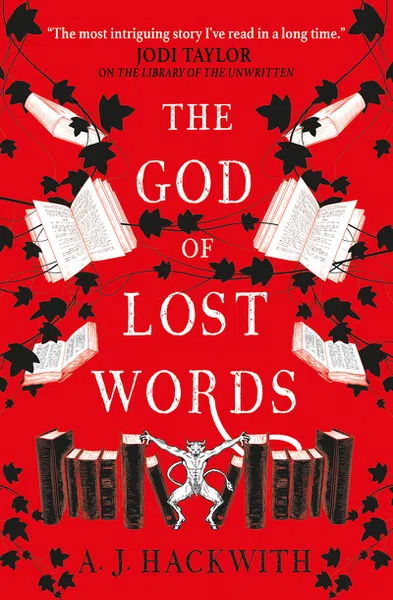
SUMMARY: To save the Library of the Unwritten in Hell, former librarian Claire and her allies may have to destroy it first.
Claire, rakish Hero, angel Rami, and muse-turned-librarian Brevity have accomplished the impossible by discovering the true nature of unwritten books. But now that the secret is out, in its quest for power Hell will be coming for every wing of the Library.
To protect the Unwritten Wing and stave off the insidious reach of Malphas, Hell’s most bloodthirsty general, Claire and her friends will have to decide how much they’re willing to sacrifice to keep their vulnerable corner of the afterlife. Succeeding would mean rewriting the nature of the Library, but losing would mean obliteration. Their only chance at survival lies in outwitting Hell and writing a new chapter for the Library. Luckily, Claire and her friends know how the right story, told well, can start a revolution. (from Titan Books)
OPINIONS: I’ve been burned a few times with sequels recently. But this one is a heck of a satisfying conclusion to the trilogy. I’m hard-pressed to choose a favourite of the three, to be entirely honest. The first sets up the characters and world, the second introduces a more expansive setting (including a very skaldic Valhalla!) and this third volume has the entire ecosystem break down and having to be re-built. The God of Lost Words is as immersive and addictive as the first two books in the series – just with even higher stakes. If you have liked the series so far, this is a must read, and if you’re new to the series this should be incentive enough to pick it up and binge all three.
I think what draws me so much to these books is that the characters, for the most part, are those who love stories as much as I do. And that makes connecting with them that much easier. But this isn’t just about that. This is a book about what it means to care about your home and the people in it, wherever that may be. About a willingness to sacrifice everything for those you hold dear. Unexpected bravery, found through research and logic, but attained through emotion. And that is what I love about these books. They are set in Hell, in what is proverbially the worst place in the universe, but they are about personal connection, about human relationships (even if most characters aren’t technically humans) and about finding out who you are inside and what your passions are. The series is at times pulpy, often fast-paced, but always full of compassion and heart.
Writing about this last book in the series has made me want to do a binge-reread of the whole trilogy, so I hope I have been able to bring across some of my love for these books. They are some of my favourite library-set stories, incorporating mythology from a variety of cultures and focusing on their characters and bringing them to (after)life. Add The God of Lost Words to your Goodreads here, or order a copy via Bookshop here (affiliate link).
-
April Hype Post
We’re running late this month, but better late than not at all. As always, do have a look at our 2022 overview post for inspiration HERE as we’re trying not to repeat titles. One that nonetheless deserves pointing out again is Spear by Nicola Griffith, which was one of my (Fab’s) absolute favourite reads of 2021 and is finally out on April 19. You can read my review of it over on Grimdark Magazine HERE.

Portrait of a Thief by Grace D. Li is out on April 5th and surprisingly for us not a SFF novel! It is a heist novel set around a Chinese American student sick of Western museums being full of looted and stolen artifacts – so he plans to steal them back. Will Chen is a senior at Harvard when he is approached with a job offer: to steal back five Chinese sculptures, looted from Beijing. The prize: fifty million dollars. The risk: their futures, and yet another thwarted attempt to get back what colonialism has stolen. And so Will puts together a crew of Chinese Americans to fill the roles needed for his heist. And all of them have just as complicated a relationship to their identity as he does. This book sounds brilliant in so many ways – a fun heist, AND a clever exploration of identity and the way in which the aftereffects of colonialism still impact society? Yes please! I’m a sucker for commercial books with deeper themes, toeing that line between entertainment and making the reader think, so this is a dream book for me and I can’t wait to get my hands on it. Pre-order a copy via Bookshop here (affiliate link).
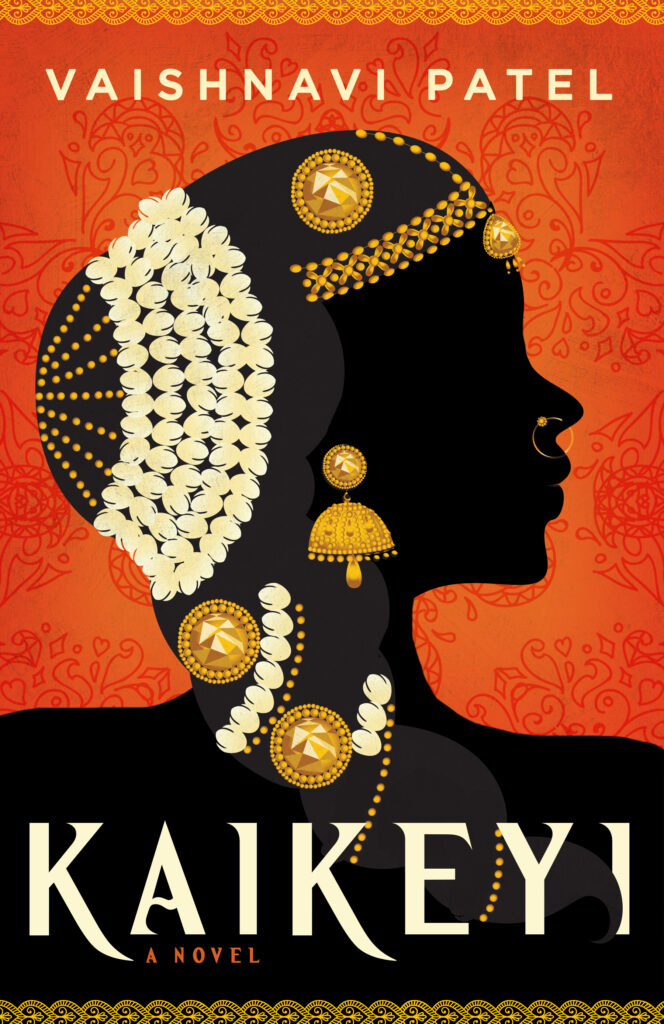
Kaikeyi by Vishnavi Patel is out on April 26 and seems to be one that has received little attention from the blogging community – at least from what I’ve seen – but huge hype from fellow authors. Inspired by Indian mythology, this is a story about cosmic evil, gods and a princess trying to change the world for the better. Kaikeyi is the only daughter of the Kingdom of Kekaya, raised on stories about the power of the gods – something which she doesn’t see or experience in her own life. Desperate, she turns to these stories and uncovers a magic that is hers alone, transforming her into a warrior and diplomat, set on improving the world for herself and the women around her. But these stories don’t bring only good and so evil threatens the cosmic order… I have heard so many good things about this and it sounds like something I will love! Pre-order a copy via Bookshop here (affiliate link).
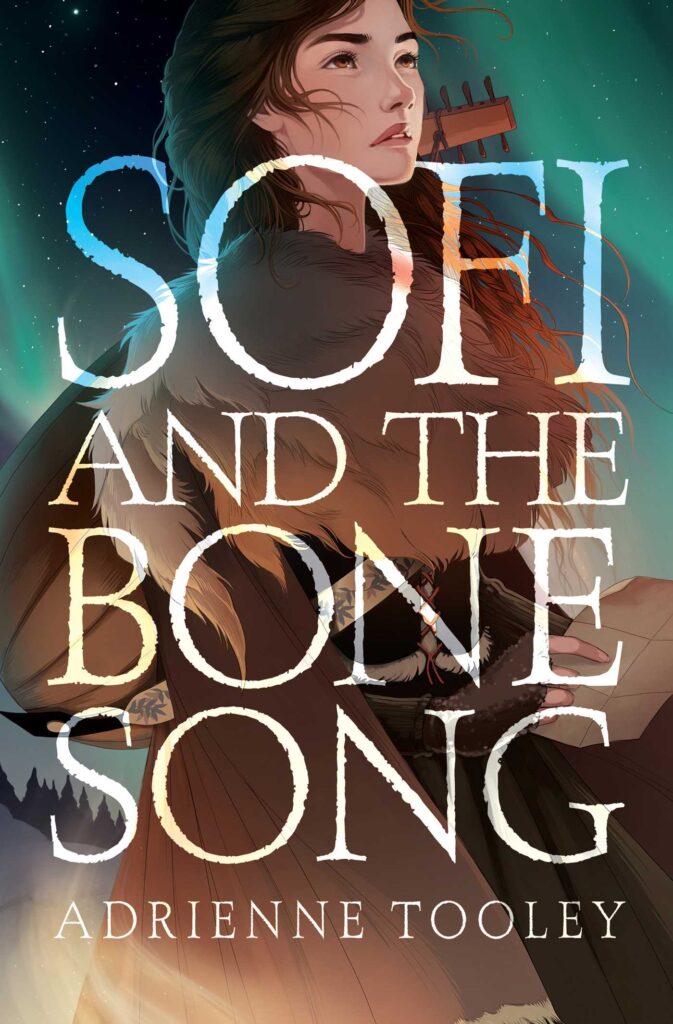
Sofi and the Bone Song by Adrienne Tooley is released on April 19 and is this month’s YA contender. And tbh, I was sold on the pretty cover before even reading the blurb (though to be fair, I read and liked Adrienne Tooley’s debut, so it had that going for it). Sofi lives in a world where only five musicians in the kingdom are allowed to compose and perform original music – the Musik. And her father is one of those – which means Sofi has been training her whole life to step into his shoes. Except, on the day of auditions, she suddenly loses to a girl called Lara who has never played the lute before. Which is odd, given that magic is strictly forbidden to be used on music. As her father dies on the same day, Sofi becomes obsessed with proving that Lara used magic to cheat her way to becoming a Musik… until she realises that there is more to Lara than she thought and Sofi has to work hard not to fall for the girl who stole her future… Pre-order a copy via Bookshop here (affiliate link).
-
The Aquanaut – Dan Santat
This is one of my new favourites. I fell head over heels for this middle grade graphic novels about deep sea creatures taking over a diving suit, addressing themes of loss, family and finding yourself. Massive thanks to Kiran at Scholastic for sending me a review copy, all opinions are entirely my own.
RELEASE DATE: 01/03/2022
STAR RATING: 5/5 ✶
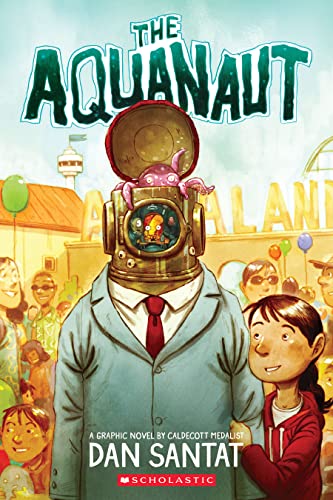
SUMMARY: The Aquanaut follows a group of determined characters on their entangled journey to save their family. First there’s a band of sea creatures struggling to find their way to a fabled paradise and safe haven for marine life. Then there’s a girl who lost her father at sea and is at risk of losing her uncle to his obsession with the legacy of a theme park. The unlikely group find their way to each other at AQUALAND, and stumble across what they are looking for in unexpected ways. (from Scholastic)
OPINIONS: This middle grade graphic novel is absolutely adorable – but also heartbreaking and sad and emotional. It is one that is suited for children just as much as for adults, and perhaps older readers even get more out of it than younger ones. It deals with family, loss and standing up for yourself. This makes it not necessarily an easy read, but one worth your while. It starts out with the loss of a parent – a topic that may be triggering for some, but handles it well and with nuance throughout the story.
I thought that the graphic novel format worked especially well to tell this particular story – the form worked with the characters and plot to shape and make them come to life in ways that a purely linguistic story would not have been able to. A great example for the value of graphic stories for young readers! (I’m a huge proponent of letting everyone read in the format that works best for them, but its always lovely to come across a story where formats other than text add so much to it.)
For me, this is a true gem of a book, and one I see myself picking up again and again when I need to have a good cry and a comfort read. It is one of my favourite graphic novels of all time and I highly recommend it to anyone.
Add The Aquanaut to your Goodreads here, or order a copy via Bookshop here (affiliate link).
-
The Knave of Secrets – Alex Livingston
‘Never gamble more than you can afford to lose’ is an excellent tag-line, but The Knave of Secrets refreshingly focuses on the losses of a single person. There is no cosmic evil rearing to engulf the world in darkness, no prophesied saviour, but the stakes are high none the less, and the protagonists must make their own luck to stay ahead in the game. Oh, and if you’re into period table-top games – this one’s for you!
RELEASE DATE: 07/06/2022
STAR RATING: 4/5 *

SUMMARY:
When failed magician turned cardsharp Valen Quinol is given the chance to play in the Forbearance Game—the invitation-only tournament where players gamble with secrets—he can’t resist. Or refuse, for that matter, according to the petty gangster sponsoring his seat at the table. Valen beats the man he was sent to play, and wins the most valuable secret ever staked in the history of the tournament.
Now Valen and his motley crew are being hunted by thieves, gangsters, spies and wizards, all with their own reasons for wanting what’s in that envelope. It’s a game of nations where Valen doesn’t know all the rules or who all the players are, and can’t see all the moves. But he does know if the secret falls into the wrong hands, it could plunge the whole world into war… (from Simon & Schuster)
OPINIONS:
This book is bound to appeal both to fans of Now You See Me and to those who like their fantasy with a side of politics. Like a clever card trick, The Knave… looks good from all angles. For me personally, it is an unusual choice: a book in which the vast expanses of the world are glimpsed in the gaps, and the real action takes place in close rooms and across gaming tables. The protagonist, a middle-aged ‘honest cheat’, is also hardly the type I tend to go for. But for all that, The Knave of Secrets was a wonderfully refreshing read. Despite it’s well-developed world, it scales the narrative down to human concerns and personal choices. Resolutions lie not in force of arms, but in a cleverly played secret.
Livingston’s research of gambling and dishonest play is impeccable, but I have to confess my attention wandered from some descriptions of gameplay. The book reminded me of a Dutch genre painting: a glimpse of a life that is all the more titillating for its brevity and its incompleteness. The characters feel like they’ll go right along with their lives after I’ve turned the final page.
From a metatextual point of view, The Knave… is cognisant of its readership. Subtle choices that problematise nationalism, elitism, and inequalities in education (especially the magical sort) are made to Livingston’s credit. It’s a book of quiet tension, and one I would openly recommend.

